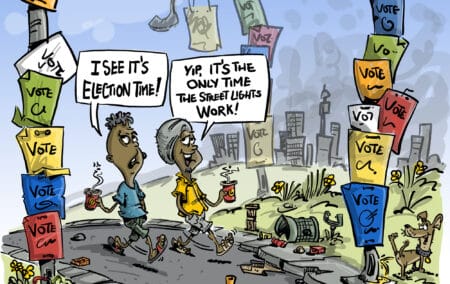The recent approval of the Fiscal Framework and the VAT hike through Parliament, which underpins core aspects of the budget, has highlighted how smaller parties in the Government of National Unity are useful pawns to the African National Congress (ANC) as the party seeks to avoid power-sharing with larger coalition partners such as the Democratic Alliance (DA).
Last week, Members of Parliament (MPs) from the Inkatha Freedom Party (IFP – 17 MPs), The Patriotic Alliance (PA – 9 MPs), ActionSA (6 MPs), United Democratic Movement (UDM – 3 MPs), Rise Mzansi (2 MPs), Build One South Africa (2 MPs), GOOD (1 MP), Al-Jamah (1 MP) and some other smaller parties helped the ANC push through a Fiscal Framework which contained a VAT hike.
Some of these parties, such as ActionSA, Rise Mzansi and Build One South Africa, have issued statements stating this was on condition that the ANC takes it back for 30 days and returns to Parliament with alternatives to VAT, to prevent its implementation on 1 May. However, the vast majority of those that voted with the ANC have remained silent, accepting that a VAT hike is going to happen.
Had these parties wanted to stop the VAT hike they could have easily done so. They could have just voted down the Fiscal Framework and it would have had to be redrafted. But instead, they tried to justify their voting behaviour by stating that they are voting for it now so that it can be revised later. Truly bizarre reasoning. If you want a piece of legislation changed, you don’t vote for it first, then come back and change it later. You change it immediately. Regardless, none of the word salads and double speak by Action SA, Rise Mzansi or BOSA have stuck. South Africans know exactly what they have done.
So does the ANC. The vote has worked out perfectly for the party. Instead of having to make proper economic growth concessions to the DA, it instead chose to cut a number of side deals with anyone it could find, stepping outside of the Statement of Intent agreement that it signed with the DA at the formation of the GNU. Why has the ANC done this?
Core aspect
I believe a core aspect of the ANC’s conflict with the DA is that the ANC is not used to having a party engage so robustly on matters of policy in the government with an intention to change them. The ANC institutionally and in its dealings with other parties uses patronage as the key mechanism through which to achieve its objectives.
Thus, when the ANC wants to get its way, its default option is generally to offer positions or facilitate access to the state, to effectively control its partners. The DA of course does not present or engage on such types of negotiations at such a level. While the party is of course entitled to power-sharing through positions, it operates on the basis that its role in government is primarily to shape policy.
The ANC’s patronage approach to politics has worked incredibly well in neutralising the smaller parties in the GNU and ensuring that they will stand by and implement ANC policy. With several parties only having one or two representatives in the National Assembly, the ANC was able to offer them an easy chairmanship role of a committee, or in some cases a ministerial role which immediately bound them to the ANC.
Having a GNU made up of various small parties who are bound to the ANC is very useful to the party because these smaller parties are useful pawns for the ANC when it needs to buffer itself against the DA. It is why the ANC created the GNU in the first place instead of merely entering a solid coalition with the DA.
Sufficient numbers
There was no reason from a votes perspective to have so many parties in the GNU. Between them, the ANC and the DA have sufficient numbers to carry any votes in Parliament. However, of course the ANC sought to figure out the best way in which it could shore itself up against the DA, and the best option was to throw a number of small parties into the mix. Those parties would do anything that the ANC said.
None of the smaller parties in the GNU have any intention of leaving it; there is nothing for them outside of the GNU. They also have no real leverage over the ANC, they can be kicked out at will if the ANC so chooses.
The majority of the smaller parties get this, they understand the pact they have made, they vote with the ANC and do as they are told. Some, like Rise Mzansi and Bosa, are trying to save face by doing what the ANC has told them to do but then trying to explain why they did it. A largely pointless exercise, but useful to ANC because it turns attention away from the party.
Despite the ANC bringing a Fiscal Framework that includes a VAT increase, it is not the party under the spotlight. Isn’t that strange? Instead it is the host of minority parties who supported the Fiscal Framework who are continuously trying to explain why they did it. The smarter minority party leaders are merely staying silent. They have accepted the loss. They know their place.
[Image: Cartoon by David Doubell]
The views of the writer are not necessarily the views of the Daily Friend or the IRR.
If you like what you have just read, support the Daily Friend

